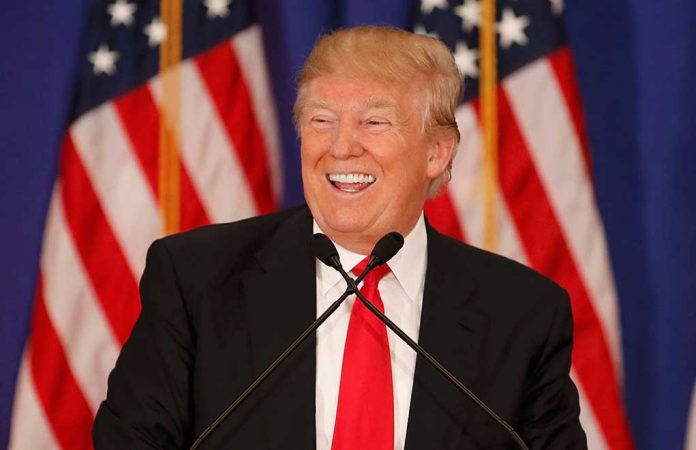
Former President Trump unveils ambitious energy plan, promising to roll back environmental regulations and boost fossil fuel production if re-elected.
At a Glance
- Trump plans to exit Paris climate accord and rescind Biden’s environmental regulations
- Aims to increase domestic oil and gas production, expand fracking operations
- Pledges to undo the Inflation Reduction Act and its clean energy initiatives
- Considers imposing high tariffs on Chinese-made electric vehicles
- Energy sector eagerly anticipates potential economic and environmental impacts
Trump’s Vision for Energy Dominance
Former President Donald Trump has unveiled a bold new energy plan that promises to restore U.S. energy supremacy if he returns to the White House. The proposed strategy marks a significant departure from the Biden administration’s focus on clean energy and climate change mitigation, instead prioritizing enhanced oil and gas production and the expansion of fracking operations.
Trump’s plan includes lifting the pause on liquefied natural gas exports and dismantling several environmental regulations put in place by the current administration. A key component of this strategy involves withdrawing from the Paris Climate Accord for a second time, a move that has raised concerns among environmental advocates.
Rollback of Biden’s Environmental Policies
The former president has made it clear that he intends to undo many of the environmental policies implemented by the Biden administration. This includes rescinding regulations on cars, power plants, and household appliances, which Trump claims have harmed industries such as steel, coal, oil, and gas.
“They annihilated your steel mills, decimated your coal jobs, assaulted your oil and gas jobs and sold off your manufacturing jobs to China and other foreign nations all over the world.” – Trump
One of the most significant targets in Trump’s crosshairs is the Inflation Reduction Act, which allocates $369 billion for clean energy projects. While Trump has pledged to undo this legislation, experts note that completely overturning it may prove challenging due to well-entrenched legal frameworks and already allocated funds.
Boosting Domestic Oil and Gas Production
A cornerstone of Trump’s energy vision is the expansion of domestic oil and gas production. This includes plans to increase drilling on federal lands and offshore, continuing efforts from his first term. The American Petroleum Institute has proposed a policy roadmap urging Trump to roll back fuel economy standards and expand offshore drilling leases.
“A Trump administration could end up with more oil produced in the United States because they would, for instance, free up land for drilling” – Claudio Galimberti
However, experts caution that presidential influence on fossil fuel production is limited in the short term, as decisions are primarily driven by economic factors and global oil prices. Claudio Galimberti notes, “Production is pretty much independent from whoever sits in the White House. It’s much more dependent on oil prices and decisions that were made long ago.”
Potential Impact on Clean Energy and Electric Vehicles
Trump’s energy plan could significantly reduce federal support for low-carbon energy technologies. He has expressed opposition to certain renewable energy sources, particularly wind power, and calls for ending wind subsidies. Additionally, Trump is considering imposing tariffs of 60% or higher on Chinese-made electric vehicles to encourage domestic production.
While these measures aim to boost American manufacturing, experts warn that such tariffs could increase costs for U.S. consumers and potentially provoke retaliatory measures from trading partners. There is also skepticism about Trump’s ability to reverse investments already made in the auto industry’s shift towards electric vehicles.
Environmental Concerns and Industry Response
Trump’s proposed policies have raised concerns among environmental advocates who worry about increased pollution and negative climate outcomes. Stan Meiburg, a former EPA official, expressed apprehension about the potential weakening of the agency’s capabilities under a Trump administration.
“I’m very worried that you will end up with an EPA that is far less capable of doing basic things, getting Superfund sites cleaned up, responding to emergencies, whether they’re hurricanes like Helene or explosions like the one in Texas which spewed out a big pile of flame out of a ruptured gas pipeline” – Stan Meiburg
On the other hand, the energy industry has shown enthusiasm for Trump’s proposals. Mike Sommers, President and CEO of the American Petroleum Institute, stated that the election results “sent a clear signal that they want choices, not mandates, and an all-of-the-above approach that harnesses our nation’s resources and builds on the successes of his first term.”
As the 2024 election approaches, the stark contrast between Trump’s energy vision and the current administration’s policies ensures that energy and environmental issues will remain at the forefront of political discourse. The potential economic and environmental implications of these divergent approaches will undoubtedly continue to fuel debate among policymakers, industry leaders, and the American public.
Sources:
- Leave the oil to me: Trump vows to unleash US energy, undo key Biden rules in 2nd term
- Trump expected to roll back environmental protections, boost oil and gas














